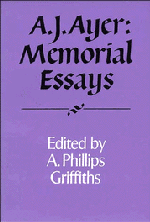Book contents
- Frontmatter
- Contents
- Preface
- A Defence of Empiricism
- Ayer: the Man, the Philosopher, the Teacher
- Ayer's Place in the History of Philosophy
- AYER'S ATTACK ON METAPHYSICS
- Ayer and World Views
- Language, Newspeak and Logic
- On the relation between Common Sense, Science and Metaphysics
- Logical Positivism and Intentionality
- Probability and the Evidence of our Senses
- Seeing Qualia and Positing the World
- Three Varieties of Knowledge
- The Importance of ‘If’
- Ayer's Ethical Theory: Emotivism or Subjectivism?
- Subjectivism and Toleration
- An Interview with A. J. Ayer
- Notes on Contributors
- References
- Index
AYER'S ATTACK ON METAPHYSICS
Published online by Cambridge University Press: 01 July 2010
- Frontmatter
- Contents
- Preface
- A Defence of Empiricism
- Ayer: the Man, the Philosopher, the Teacher
- Ayer's Place in the History of Philosophy
- AYER'S ATTACK ON METAPHYSICS
- Ayer and World Views
- Language, Newspeak and Logic
- On the relation between Common Sense, Science and Metaphysics
- Logical Positivism and Intentionality
- Probability and the Evidence of our Senses
- Seeing Qualia and Positing the World
- Three Varieties of Knowledge
- The Importance of ‘If’
- Ayer's Ethical Theory: Emotivism or Subjectivism?
- Subjectivism and Toleration
- An Interview with A. J. Ayer
- Notes on Contributors
- References
- Index
Summary
In an article contributed to Mind in 1934, the young A. J. Ayer declared war on metaphysics, claiming that his destruction of the metaphysicians’ arguments rested on the establishment of the sheerly non-sensical character of their statements. Their errors were syntactical; the combination of symbols in the sentences with which they expressed their propositions violated fundamental principles of significance.
Where statements of fact were concerned, the authority of the principle of verification was absolute. If the often quoted formulation of this principle as the ‘meaning of a proposition is the method of its verification’ was drastically criticized, its underlying insistence remained that we must be able to specify the circumstances which would confirm or discredit the proposition in question. In the case of Moritz Schlick's often quoted example ‘There are mountains on the other side of the moon’, no one disputed its claim to significance on the ground that at the time of its utterance, it defied verification; it was verifiable in principle, and therefore perfectly intelligible. Whereas the claim that God exists defied any attempt made to specify conditions under which we would suppose it confirmed or refuted. Agnostics and atheists as much as theists were engaged in unintelligible disputes. We could specify conditions under which we would admit the reality of entities totally remote from our immediate experience, or dismiss claims made for their inclusion in the furniture of the describable world, for instance (to take more recent examples) neutrinos or ‘black holes’. But with alleged transcendent realities, whether the Judaeo-Christian God or the Platonic ‘Idea of the Good’, it was altogether otherwise.
- Type
- Chapter
- Information
- A. J. Ayer: Memorial Essays , pp. 49 - 62Publisher: Cambridge University PressPrint publication year: 1992

